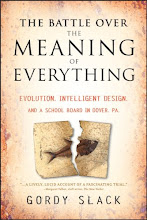 |
| A pill to erase memories? |
In Jonah Lehrer's
cover story in the current issue of WIRED, he surveys research on the feasibility of using drugs to erase traumatic memories. Each time we remember a particular long-term memory, we take it down from the neurological shelf on which it is stored and make it vulnerable to breakage or change. In fact, the scientists featured in Lehrer's piece pose, memories are inevitably altered (not reinforced) each time they are retrieved. To put them back safely on the shelf, even in their new, altered state, our brains apparently need to make some proteins to lock them safely back in place. But if a PTSD patient, say, recalls a traumatic memory and is simultaneously given a drug that blocks protein synthesis where that memory is stored, Wham! the memory gets whacked before it can be put back on the storage shelf.
Voila, the PTSD is gone. The leading candidate drug is a form of protein kinase called
PKMzeta. Lehrer, and the neuroscientists he profiles in the piece, seem to expect this technique to become precise, reliable, and safe. That remains to be seen.
The piece is provocative and fun, but Lehrer's makes, I think, a weak argument that since memories are all falible and mutable anyway, there's no real problem with erasing the ones we don't like. Sure memories, and the mechanism by which we keep them, are imperfect. That's why we try so hard to anchor the important ones outside of our brains in other ways: by documenting them and by sharing them with others to keep our perceived reality from drifting too far from the historical one. We can't overestimate the importance of preserving our tenuous link to historical reality, though, either as individuals or as a society. In a world as perilous as ours, we can't afford to forget what's really happened. Remembering with fidelity, hard as it is, is key to moving forward safely and successfully. If we start to whack unpleasant memories, we do so at our collective peril.



No comments:
Post a Comment